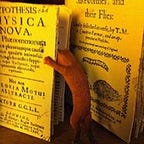For the Birds
On EEBO on my Day Off
All Summer I vowed to use the field-specific databases at my university’s library even though I work a 12-month desk job and don’t do much actual research right now; I did that and tried to write about it as a way to ensure I did my weekly visits to these resources and get my clicks and pageview statistics counted, using it so as not to lose it, so-to-speak.
Today I took the day off work, mostly because I need to use vacation days before I leave my administrative appointment in June. So I figured I should do some EEBOing even though it was a day “off.”
I started the morning by scrolling through Histrio-mastix (1610), which I’m writing about in the fourth chapter of my book. It’s a fun play with lots of quotable lines, including the two below, though these have nothing to do with what i’m working on.
By the middle and end of the day I wasn’t really working on the chapter or reading the play carefully. Instead, I was kind of enjoying just poking around my school’s version of EEBO, whose searches yield so many more texts than it used to now that the TCP Phase I texts are transcribed.
For some reason, Dekker’s The Owle’s Almanac (1618) came up in a search I did for fun. I really love that woodcut of the little Owl writin’ out his prophecies.
It looks like the Marlowe/Dr. Faustus study a bit, with similar accoutrements on the wall, only it’s an owl rather than a human scholar. He’s got his own little desk and he writes WITH A FEATHER! That’s just freaking adorable, is it not??
Unlike the Faustus image, the window to this Owl’s study is all dark, so he’s just been prognosticating away into the late hours. But I guess for owls, that’s just normal awake time.
Anyway, owls weren’t really the thing I had been looking for in my original search, but I figured there must be some good owl woodcuts in other texts. With “owls” as my search term, I found TONS of books on birds with lots of illustrations, including a book from 1678 that had engravings to rival some Audubon renderings! That one, as the title page boasted, was “illustrated by most elegant figures, nearly resembling the live birds, engraven in LXXVII copper plates.”
Here are some screenshots of pictures in a few other things that came up in my search:
This one, From Drayton’s The Owl (1604) was the cutest. This owl looks somewhat worried or exasperated. He’s basically thinking “I’ve got to get off Twitter.”
The one below is from a ballad called “My Bird is a Round-head.” It makes me laugh. It’s a civil war joke, obviously, that revolves around a puritan who gets really mad at his neighbor for having a may-pole up and also for having an Owle named Round-head. It’s also a silly animal joke, because the owl has a literal round head. It makes light of neighborly disputes over politics and the very words that marked political and religious difference. One contemporary with the pamphlet would be the dispute over ‘militia’ and ‘commission of array,’ both the words for mechanisms of raising troops and the mechanisms themselves, since one was used by Parliament and the other the King. Another dispute brewed over whether furniture in church was called an ‘altar’ or a ‘table.’ These guys fight over things that are symbols standing in for more substantive disagreements over doctrine and behavior; here, the fact that a fun-loving maypoler named his Owl Round-head mocks the puritan and infuriates him as much as any other ideological disagreement they might have.
I like it for its relationship to political contexts in 1642, but I also like it because it reads to me like a 2021 sorry-not-sorry confessional. My Bird is a Round-head, and I will feel no shame.
Finally, though this is not a picture of an Owl, I also will share the title page of another text that came up because of a dialogue it contains called “Loves Ovvle” between “Loue,” presumably a boyish cupid/Eros, and “an olde man.” I didn’t read it, but I’d like to think of it as a grumpy Ok-Boomer conversation.
This text, as you can see, also contains the hand of a reader, one Mary Brooke, it looks like. I don’t know anything about Mary Brooke or the text itself (other than the assessment I have made without reading it!).
But this means it would make an interesting study for anyone who collects images of books owned/read by early modern women readers! Perhaps this is you?
I tweeted this image with the #herbook hashtag and alerted Martine van Elk, one of the people who runs this excellent blog on Early Modern Female Book Ownership. If you know something about Mary Brooke and her books, you could contribute to the blog by getting in touch with Martine and others, Mark Empey, Sarah Lindenbaum, Tara Lyons, Erin McCarthy, Micheline White, and Georgianna Ziegler.
For me, it’s now after 5 and my day off work is now like any other week day after 5, so I’ll leave off here. But I hope you liked these Owls!
You know what’s funny? The Playing Company in Histro-Mastix is patronized by Sir Oliver Owlet! OOOhhhhh, Spooky! I mean, HOOO HOOOOOO.
